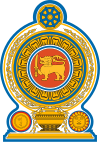
Sirima Ratwatte Dias Bandaranaike, commonly known as Sirimavo Bandaranaike, was a Sri Lankan politician. She was the world's first female prime minister when she became Prime Minister of Sri Lanka in 1960. She chaired the Sri Lanka Freedom Party (SLFP) from 1960 to 1994 and served three terms as prime minister, two times as the chief executive, from 1960 to 1965 and from 1970 to 1977, and once again in a presidential system from 1994 to 2000, governing under the presidency of her daughter Chandrika Kumaratunga.
Katunayake, is a suburb of Negombo in Western Province, Sri Lanka. It is the site of Bandaranaike International Airport, the primary international air gateway to Sri Lanka. With the change of government in 1977 and the introduction of the open economy policy a large area was allocated to create a free trade zone.
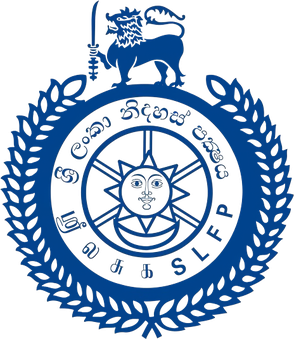
The Sri Lanka Freedom Party is one of the main political parties of Sri Lanka. It was founded by S. W. R. D. Bandaranaike in 1951 and has been one of the two largest parties in the Sri Lankan political arena since. It first came to power in 1956 and has served as the predominant ruling party on a number of occasions.
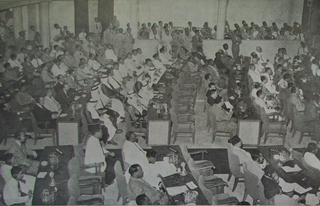
The first large-scale Asian–African or Afro–Asian Conference, also known as the Bandung Conference, was a meeting of Asian and African states, most of which were newly independent, which took place on 18–24 April 1955 in Bandung, West Java, Indonesia. The twenty-nine countries that participated represented a total population of 1.5 billion people, 54% of the world's population. The conference was organized by Indonesia, Burma (Myanmar), India, Ceylon, and Pakistan and was coordinated by Ruslan Abdulgani, secretary general of the Ministry of Foreign Affairs of the Republic of Indonesia.

For India, the concept of non-alignment began as a policy of non-participation in the military affairs of a bipolar world and in the context of colonialism aimed towards optimum involvement through multi-polar participation towards peace and security. It meant a country should be able to preserve a certain amount of freedom of action internationally. There was no set definition of non-alignment, which meant the term was interpreted differently by different politicians and governments, and varied in different contexts. The overall aims and principles found consensus among the movement members. Non-aligned countries, however, rarely attained the freedom of judgement they desired and their actual behaviour towards the movement's objectives, such as social justice and human rights, were unfulfilled in many cases. India's actions often resembled those of aligned countries. The response of the non-aligned nations during India's wars in 1962, 1965 and 1971 revealed non-aligned positions on issues such as secession. The non-aligned nations were unable to fulfil the role of peacekeepers during the Indo-China war of 1962 and the Indo-Pakistan war of 1965 despite meaningful attempts. The non-aligned response to the Bangladesh Liberation War and the following 1971 Indo-Pakistan War showed most of the non-aligned nations prioritised territorial integrity above human rights, which could be explained by the recently attained statehood for the non-aligned. During this period, India's non-aligned stance was questioned and criticized. Jawaharlal Nehru had not wanted the formalization of non-alignment and none of the non-aligned nations had commitments to help each other. The international rise of countries such as China also decreased incentives for the non-aligned countries to stand in solidarity with India.
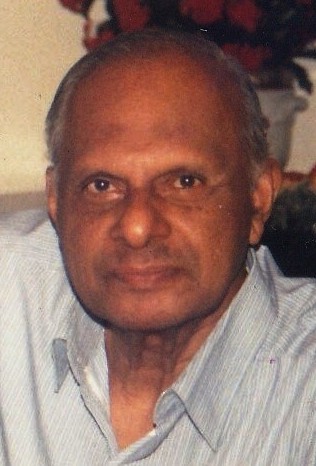
Deshamanya Vernon Loraine Benjamin Mendis was a prominent Sri Lankan diplomat, who served as the United Nations' Special Envoy to the Middle East. He is referred to as the Sri Lanka's Father of Diplomacy due to his role in formation of the country's diplomatic service and has served as Sri Lankan High Commissioner to the United Kingdom, Canada; Ambassador to France, Cuba and Secretary General of the Non Aligned Movement.

The Bandaranaike Memorial International Conference Hall (BMICH), is a convention center located in Colombo, Sri Lanka. Built between 1970 and 1973, the convention centre was a gift from the People's Republic of China in memory of Solomon Ridgeway Dias Bandaranaike, Prime Minister (1956–1959).

The Socialism in Sri Lanka or Sri Lankan socialism is a political philosophy that is shared by various political parties of the country. Socialist parties, especially the Trotskyist Lanka Sama Samaja Party, have played a major role in the country's history from the time of the Sri Lankan Independence movement. Socialist ideology shaped the principal economic and social policies of Sirimavo Bandaranaike and the Sri Lanka Freedom Party during the 1970s. Several sectors of the economy including banking, insurance and some privately owned estates were nationalized during her tenure. Bread and several essential items were rationed by the government at the time.

S.W.R.D. Bandaranaike's foreign policy emphasized the idea of non-alignment however he had strong ties with socialist and communist nations as well as with Arab nations and India. He shifted the foreign policy of Sri Lanka from being pro-western under the previous right wing United National Party governments to non-alignment under his left wing Sri Lanka Freedom Party government. A remarkable accomplishment of his foreign policy was removing British naval and air bases from Sri Lanka.

The Socialist Federal Republic of Yugoslavia was one of the founding members of the Non-Aligned Movement. Its capital, Belgrade, was the host of the First Summit of the Non-Aligned Movement in early September 1961. The city also hosted the Ninth Summit in September 1989.

Mexico–Sri Lanka relations are the diplomatic relations between Mexico and Sri Lanka. Both nations are members of the United Nations. Neither country has a resident ambassador.

The 18th Summit of the Non-Aligned Movement was held October 25–26, 2019 in Baku, Azerbaijan. The summit was attended by the delegation from more than 120 countries.

Summit Conference of Heads of State or Government of the Non-Aligned Movement on 1–6 September 1961 in Belgrade, Yugoslavia was the first conference of the Non-Aligned Movement. A major contributing factor to the organization of the conference was the process of decolonization of a number of African countries in the 1960s. Some therefore called it the ″Third World's Yalta″ in reference to 1945 Yalta Conference.

The Non-Aligned Movement (NAM) is a forum of 120 countries that are not formally aligned with or against any major power bloc. It was founded with the view to advancing interests of developing countries in the context of Cold War confrontation. After the United Nations, it is the largest grouping of states worldwide.
Second Summit Conference of Heads of State or Government of the Non-Aligned Movement on 5–10 October 1964 in Cairo, United Arab Republic (Egypt) was the second conference of the Non-Aligned Movement which followed the Belgrade Conference of 1961 and preceded the Lusaka Conference of 1970. The city of Cairo was selected as a host of the summit conference at the preparatory meeting held in Colombo, Ceylon, on March 23, 1964. At the beginning of the conference the chairmanship of the Movement was transferred from the President of Yugoslavia Josip Broz Tito to the President of Egypt Gamal Abdel Nasser.

5th Summit of the Non-Aligned Movement on 16–19 August 1976 in Colombo, Sri Lanka was the conference of Heads of State or Government of the Non-Aligned Movement. 86 nations participated in the summit with additional 30 observers and guests representing all the continents in the world. The Summit is the biggest international conference ever held in Sri Lanka and one of the greatest achievements in its foreign policy. The event took place at the Bandaranaike Memorial International Conference Hall, the first purpose-built conference hall in Asia. It was the first heads of state or government summit of the movement to be organized in Asia. The decisions on the NAM Coordination Bureau organisation and membership conditions were formally defined at the Colombo Summit. The body was to have 25 members and was expected to meet regularly at the United Nations Headquarters in New York City.
Archibald Wickeramaraja Singham, also known as Archie Singham or A. W. Singham (1932-1991) was a Sri Lankan political scientist and historian, professor of political science at Brooklyn College of City University of New York. He was an authority on the Caribbean and a participant in the Non-Aligned Movement.
1973 Non-Aligned Movement Standing Committee Conference took place on 13-15 May 1973 in Kabul, the capital city of Afghanistan. The country participated in the work of the movement since the 1st Summit of the Non-Aligned Movement in Belgrade in 1961. Afghanistan perceived Non-Alignment as a guaranty of peace in independence in the context in which the country shared a long border both with Soviet Union and CENTO member states. The 1973 meeting was opened by the Minister of Foreign Affairs of Afghanistan Mohammad Musa Shafiq. While serving as a host country, Afghanistan decided to nevertheless play marginal role in the event concerned how its more prominent role may be perceived by major powers. Delegation of Sri Lanka proposed Colombo as the host of the 5th Summit of the Non-Aligned Movement which was strongly supported by SFR Yugoslavia. Panama joined the NAM as an observer, while Bangladesh, despite reservations by Pakistan, joined as a full member state. Yugoslavia supported unofficial interest by Australia and North Korea to attend the next meeting with observer status. India, Guyana and SFR Yugoslavia played particularly active role in preparation of the working materials for the following summit in Algeria. Chile proposed inclusion of discussion on measures against global corporate threats and measures to protect sovereign control over natural resources. In July of the same year the host country was faced with 1973 Afghan coup d'état after which the new authorities stated their intention to maintain country's non-aligned position.
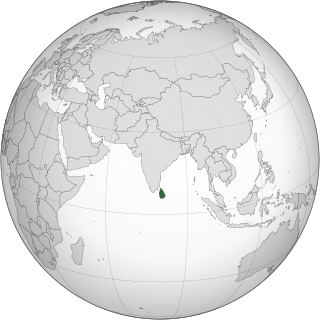
Sri Lanka–Yugoslavia relations were historical foreign relations between Sri Lanka and now split-up Socialist Federal Republic of Yugoslavia. In the period of the Cold War both countries were the founders and among core members of the Non-Aligned Movement. Diplomatic relations were established on 14 October 1957.
Tanzania is an active and prominent member state of the Non-Aligned Movement since the days of independence of Tanganyika in 1961. In early days of the movement President Julius Nyerere was recognized as one of the leading figures in the movement and among Third World leaders in general. His government promoted close adherence to non-alignment principles in which Global North and Global South division was more important than Cold War East–West dichotomy, supported African cooperation, engaged in a strong criticism of superpower intrusion in African affairs and supported the establishment of the New International Economic Order.













